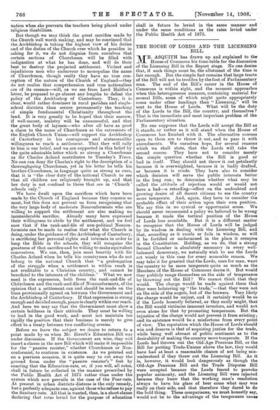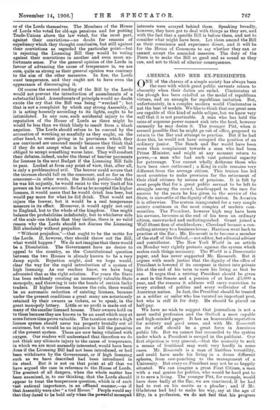THE HOUSE OF LORDS AND THE LICENSING BILL.
MR. ASQUITH has drawn up and explained to the House of Commons his time-table for the discussion of the Licensing Bill in the Report stage. No one denies that, if such things must be, the allotment of the time is fair enough. But the simple fact remains that large tracts of the Bill will not be trodden by the foot of Parliamentary man. The end of the Bill's career in the House of Commons is within sight, and the moment approaches when this heterogeneous measure, containing material for several Bills, some of which might quite appropriately come under other headings than " Licensing," will be sent to the House of Lords. What will be the duty of the Lords to the Bill, the country, and themselves ? That is the immediate and most important problem of the Parliamentary situation.
No one supposes that the Lords will accept the Bill as it stands, or rather as it will stand when the House of Commons has finished with it. The alternative courses open to them are to throw it out, and to pass it with amendments. We ourselves hope, for several reasons which we shall state, that the Lords will take the second course. They have not to consider merely the simple question whether the Bill is good or bad in itself. They should not throw it out petulantly because it is overweighted, because it is badly drafted, or because it is crude. They have also to consider which decision will serve the public interests better in the long run ; to determine whether what may be called the attitude of rejection would or would not have a bad—a retarding—effect on the undoubted and growing desire of all decent citizens to see the country more temperate. And, again, they have to consider the probable effect of their action upon their own position. We say this in no cynical or opportunist sense. We should never recommend a policy we believed to be wrong because it made the tactical position of the House of Lords less assailable. But it is a different matter to recognise that the House of Lords will be judged by its wisdom in dealing with the Licensing Bill, and that, according as it excels or fails in wisdom, so will it be fortified or undermined in the place it occnpies in the Constitution. Holding, as we do, that a strong Second Chamber is absolutely necessary in every well- balanced democracy, we naturally wish -to see the Lords act wisely in this case for every nameable reason. We may take it for granted that the Lords, man for man, want the country to be more temperate quite as much as the Members of the House of Commons desire it. But would they publicly range themselves on the side of temperance by throwing out the Bill ? We cannot think that they would. The charge would be made against them that they were bolstering up " the trade,"—that they were not on the side of the angels, but of the brewers. Very likely the charge would be unjust, and it certainly would be so if the Lords honestly believed, as they easily might, that the Bill would victimise innocent investors, and would not even atone for that by promoting temperance. But the injustice of the charge would not prevent it from existing ; and its existence would be a misfortune from every point of view. The reputation which the House of Lords should win and deserve is that of acquiring justice for the trade, while being well abreast of public sentiment as to the desirability of making the country more temperate. If the Lords had thrown out the Old-Age Pensions Bill, or the Bill for putting Trade-Unions above the law, they would have had at least a reasonable chance of not being mis- understood if they threw out the Licensing Bill. As it is, however, it would look dangerously as though the Old-Age Pensions Bill and the Trade Disputes Bill were accepted because the Lords feared to provoke popular animosity, and the Licensing Bill were rejected because they knew that the working man's resolution always to have his glass of beer come what may was really on their side, and that therefore they dared to do the bold thing. These comparisons, we must honestly say, would not be to the advantage of the temperance cause or of the Lords themselves. The Members of the House of Lords who voted for old-age pensions and for putting Trade-Unions above the law voted, for the most part, against their convictions—no doubt for reasons of expediency which they thought conclusive, but still against their convictions as regarded the particular point—but in rejecting the Licensing Bill they would be voting against their convictions in another and even more un- fortunate sense. For the general opinion of the Lords in favour of advancing the cause of temperance is, we are sure, quite as strong as their general opinion was contrary to the aim of the other measures. In fine, the Lords want temperance, and they ought not to have even the appearance of discouraging it.
Of course the second reading of the Bill by the Lords would not prevent the introduction of amendments of a substantial kind. Amendments of principle would no doubt excite the cry that the Bill was being " wrecked " ; but that is not a complaint by which any strong Assembly, if it is acting honestly according to its lights, ought to be intimidated. In any case, such accidental injury to the reputation of the House of Lords as there might be would be less than we think likely to result from a blank negation. The Lords should refuse to be coerced by the accusation of wrecking as manfully as they ought, on the other hand, to resist giving in to provisions which they are convinced are unsound merely because they think that if they do not accept what is bad at once they will be obliged to accept something worse later. They will conduct their debates, indeed, under the threat of heavier payments for licenses in the next Budget if the Licensing Bill fails to pass. Looked at from any point of view, that, after all, is only a problematical evil. The brewer could secure that the increase should fall on the consumer, and so far as the consumer—in other words, the British public—felt that he was hit unjustly, he would resist to the very limit of his powers on his own account. So far as he accepted the higher licenses, it would mean that he would drink less beer, but would pay more for what he did drink. That would not injure the brewer, but it would be a real temperance measure in its effect. Moreover, it would apply not only to England, but to the whole of the kingdom. One might balance the probabilities indefinitely, but to whichever side of the scale one thinks that they incline, there is no valid reason why the Lords should not discuss the Licensing Bill absolutely without prejudice.
" Without prejudice,"—that ought to be the motto for the Lords. If, however, they should throw out the Bill, what would happen ? We do not imagine that there would be a Dissolution. The Government have no desire to appeal to the country, as the Constitutional question between the two Houses is already known to be a very damp squib. Rejection might, and we hope would, clear the way for the rapid introduction of a system of high licensing. As our readers know, we have long advocated that as the right solution. For years the State has been recklessly creating an immensely valuable State monopoly, and throwing it into the hands of certain lucky traders. If higher licenses became the rule, there would be an automatic reduction of existing licenses, because under the present conditions a great many are notoriously retained by their owners as tickets, so to speak, in the great monopoly lottery. Little or no profit is made out of many of the smaller licensed houses. Their owners hold on to them because they are known to be an asset which may at some future time prove valuable. The taxation under a, high license system should never tax property brutally out of existence, but it would be no injustice to kill the parasites of the present system. These are now being vitalised with oxygen. Our readers will understand that therefore we do net think any ultimate injury to the cause of temperance, in which we are most earnestly interested, would have been done if the Licensing Bill had not been introduced, or had been withdrawn by the Government, or if high licensing such as we have described had been introduced in its stead. But it is not on that point at all that we have argued the case in reference to the House of Lords. The greatest of all dangers, when the whole matter has been examined, is, to our thinking, that the Lords should appear to treat the temperance question, which is of such vast national importance, in an offhand manner,—as if that Assembly were also " a tied House." People would say that they dared to be bold only when the powerfulmoneyed interests were arrayed behind them. Speaking broadly, however, they have got to deal with things as they are, and with the fact that a specific Bill is before them, and not to consider what might have been. Let them amend the Bill as their conscience and experience direct, and it will be for the House of Commons to say whether they can or cannot accept the amended measure. The duty of the Peers is to make the Bill as good and as sound as they can, and not to think of ulterior consequences.











































 Previous page
Previous page